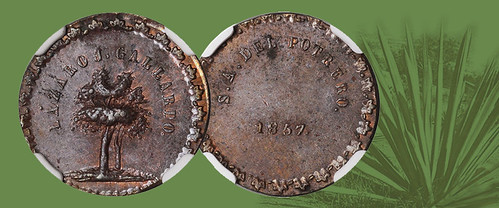
PREV ARTICLE
NEXT ARTICLE
FULL ISSUE
PREV FULL ISSUE
HACIENDA TOKEN OF TEQUILA MAKER GALLARDOStack's Bowers cataloger Jeremy Bostwick published a blog article October 10, 2019 on an interesting token in the firm's upcoming online auction. -Editor  One of the world's more popular distilled spirits was created, somewhat comically, out of shortage of brandy, as explorers in the New World needed a replacement for their alcoholic beverage of choice. Following Spain's conquest and subsequent establishment of colonies in areas such as modern-day Mexico, soldiers and settlers quickly found themselves running short on products they were accustomed to, such as alcohol. Around 1535, with no grapes to be found, the Spaniards focused upon a different source of sugars for fermentation—the agave plant. The agave had long been used by natives as the base for a milky, alcoholic beverage known as pulque—with an ABV in the 5-7% range—but it was the European travelers who took to distilling the plant. They produced a mezcal that was anywhere between 35-55% ABV, more akin to distilled spirits that would have been available in and around Spain. Over the next three centuries, this beverage would continue to be produced and refined, with subtle nuances applied to its craft. In the 19th century, above ground, steam heated ovens began to be utilized for distillation in some instances, resulting in a beverage that was smoother and sweeter, as opposed to the more savory and smoky notes produced from the traditional clay or copper pots. The former, drawing mostly or only from blue agave, became known as tequila, so named for the town which made it popular. Located west of Guadalajara and in the state of Jalisco, Tequila became an epicenter for the drink, sparking countless producers and methods as the craft was perfected. One such producer was Lázaro J. Gallardo, who also owned a tavern in Tequila. In 1858, he created a method that he called his selección suave, or smooth selection, whereby newer tequilas were blended with older, smoother, and more refined tequilas, allowing for the highest quality available. This method allowed 'rougher' patches in any particular batch to be rounded out against the rest, creating a smooth, steady baseline that would become immensely popular for Gallardo. So popular was this method that he released the tequila under its own label, styled as Gran Centenario, a brand that is still produced—using Gallardo's method—even to this day. In this month's Collectors Choice Online (CCO) auction, we have a rather interesting token from Gallardo's hacienda at San Antonio del Potrero in Jalisco. Graded NGC MS-61 Brown, this 1/8 Real token features two trees and Gallardo's name on the obverse, while the reverse bears reference to the hacienda. This splendid piece is dated 1857—one year before Gallardo perfected his selección suave—and is a charming link to an important time in the manufacturing and marketing of one of the world's more popular distilled spirits. It's not my drink of choice, but fortunes have been made from distilling tequila. Interesting story. -Editor To read the complete article, see:
To read the complete lot description, see:
 Wayne Homren, Editor The Numismatic Bibliomania Society is a non-profit organization promoting numismatic literature. See our web site at coinbooks.org. To submit items for publication in The E-Sylum, write to the Editor at this address: whomren@gmail.com To subscribe go to: https://my.binhost.com/lists/listinfo/esylum All Rights Reserved. NBS Home Page Contact the NBS webmaster 
|